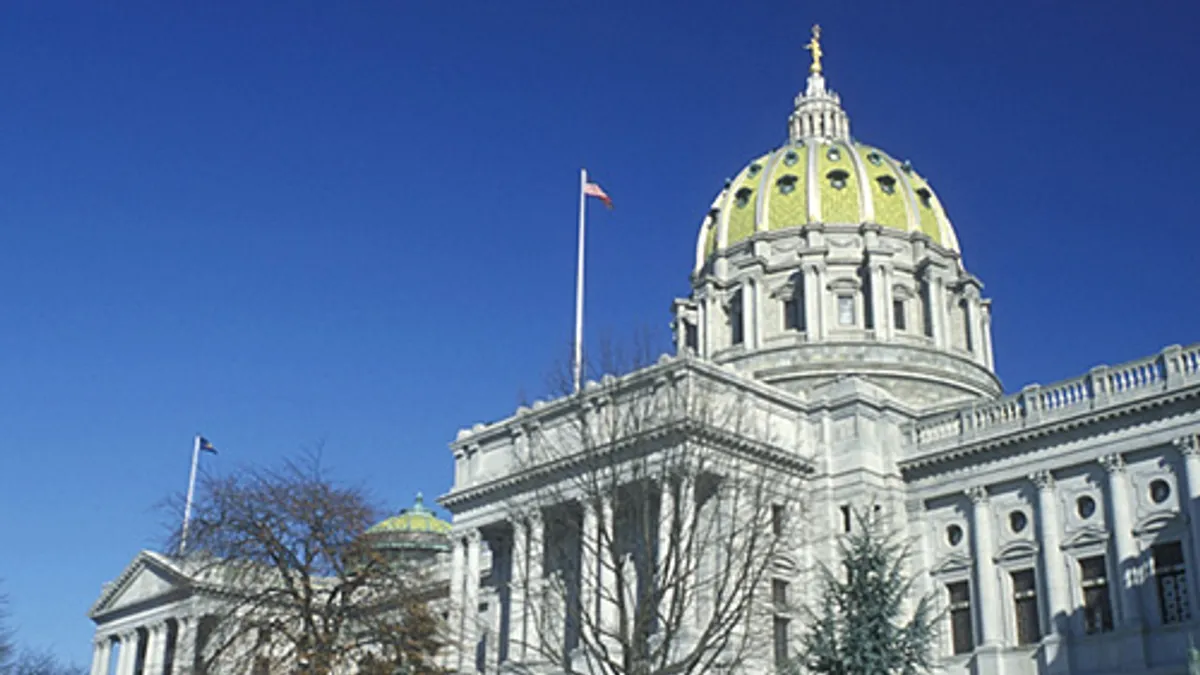Dive Brief:
- The Pennsylvania House of Representatives on Wednesday passed HB 2025, which "clarifies that the Department of Environmental Protection (DEP) does not have authority to join the Regional Greenhouse Gas Initiative (RGGI) or similar state or regional greenhouse gas cap-and-trade programs unless authorized by the General Assembly."
- The move came the same day the state's Department of Environmental Protection released an analysis showing that cutting carbon emissions from power plants would save billions of dollars and hundreds of lives.
- Pennsylvania Gov. Tom Wolf, D, last month, ordered the DEP to come up with rules by Sept. 15 that would allow the state to join RGGI. Wolf set a goal last year for Pennsylvania to reduce its net greenhouse gas emissions 26% below 2005 levels by 2025 and 80% below 2005 levels by 2050.
Dive Insight:
Pennsylvania is deciding whether to join the 10-state Regional Greenhouse Gas Initiative and the DEP's analysis presents a case for doing so.
The analysis indicated that participating in RGGI could save the lives of 639 Pennsylvanians by 2030 due to lower emissions of carbon dioxide and other power plant pollutants. In addition, participation will produce a net increase of more than 27,000 jobs and $1.9 billion to Pennsylvania's Gross State Product, it found.
"We know that cleaner sources of energy are good for the environment, but this helps quantify the benefits to people's health as well," DEP Secretary Patrick McDonnell said in a statement. "The data is clear that cutting air pollution by participating in RGGI will save people's lives - full stop," he added.
The estimated benefits in the analysis do not include jobs created due to investment of the more than $300 million Pennsylvania is projected to receive each year from auctions of RGGI allowances, which allow power plants to comply with the program and can be bought or sold depending on how well companies are doing in achieving their emissions limits.
According to the DEP, the "analysis will be presented to the [state's] Environmental Quality Board along with the rest of the regulatory analysis, which details the total costs and benefits of participating in RGGI."
Gov. Wolf directed the DEP last October to develop a plan for the state to join RGGI. But legislators are trying to block that.
The House Republican Caucus issued a statement yesterday after the bill's passage saying that "every other state involved in [RGGI] was authorized to participate by its respective state legislature, not unilateral executive action."
The dispute centers on whether a move to join the initiative would produce a carbon tax, which would require legislative approval. Republicans say it would.
"Participation in RGGI requires a carbon tax, which could eliminate more than 30% of the state's current energy generation capacity, undermine our status as an electricity exporter, trigger thousands of lost jobs and massive property tax increases from closed plants, not to mention increased electricity rates for everyone. Virginia, for instance, just joined RGGI and Dominion, its utility, just announced $50/month increase," the Republican Caucus statement continued.
Pennsylvania DEP spokesperson Neil Shader declined to comment on the passage of HB 2025 beyond saying that Gov. Wolf planned to veto the bill. Environmentalists are counting on that while also calling on the Senate to block it.
"We are strongly urging the [Pennsylvania] Senate to oppose this obstructionist bill as Pennsylvanians overwhelmingly want solutions to the carbon pollution problem that is harming the climate and public health in the commonwealth. We are grateful that the governor has stated his intent to veto this bad bill should it reach his desk," Mandy Warner, director of climate and clean air policy at the Environmental Defense Fund, said in a statement emailed to Utility Dive.
The state's Chamber of Commerce earlier in the week expressed a number of concerns with joining RGGI.
In a July 7 letter to members of the Pennsylvania House, the chamber said it has "several outstanding concerns with respect to RGGI. We remain concerned over the potential leakage of power generation resources to neighboring states within the PJM grid who do not participate in RGGI," the letter said.
The chamber is "very concerned with the regulatory actions taken by some RGGI states to block pipeline development that would deliver Pennsylvania's natural gas to northeastern markets, as well as various regulatory petitions filed by these states to the Environmental Protection Agency asking for more punitive regulatory actions against our energy and manufacturing industries," the letter stated.
"These are issues that can and must be resolved through a deliberative process that involves the legislature, the administration and the regulated community and that addresses long-needed reforms to the state's tax and energy regulatory policy."
HB 2025 now moves to the Senate for consideration.
Correction: An earlier version of this story had the incorrect day for the passage of HB 2025. The Pennsylvania House approved it yesterday.














